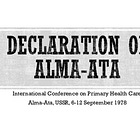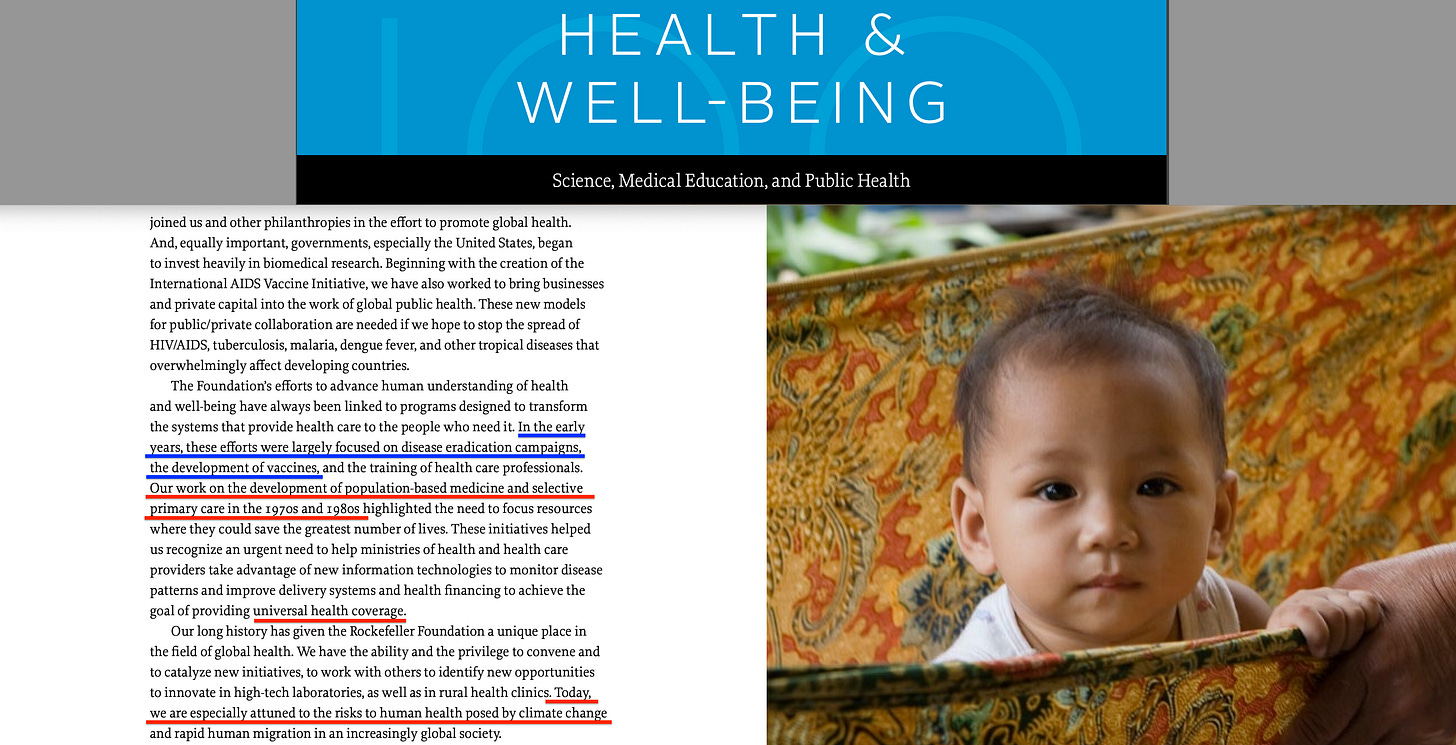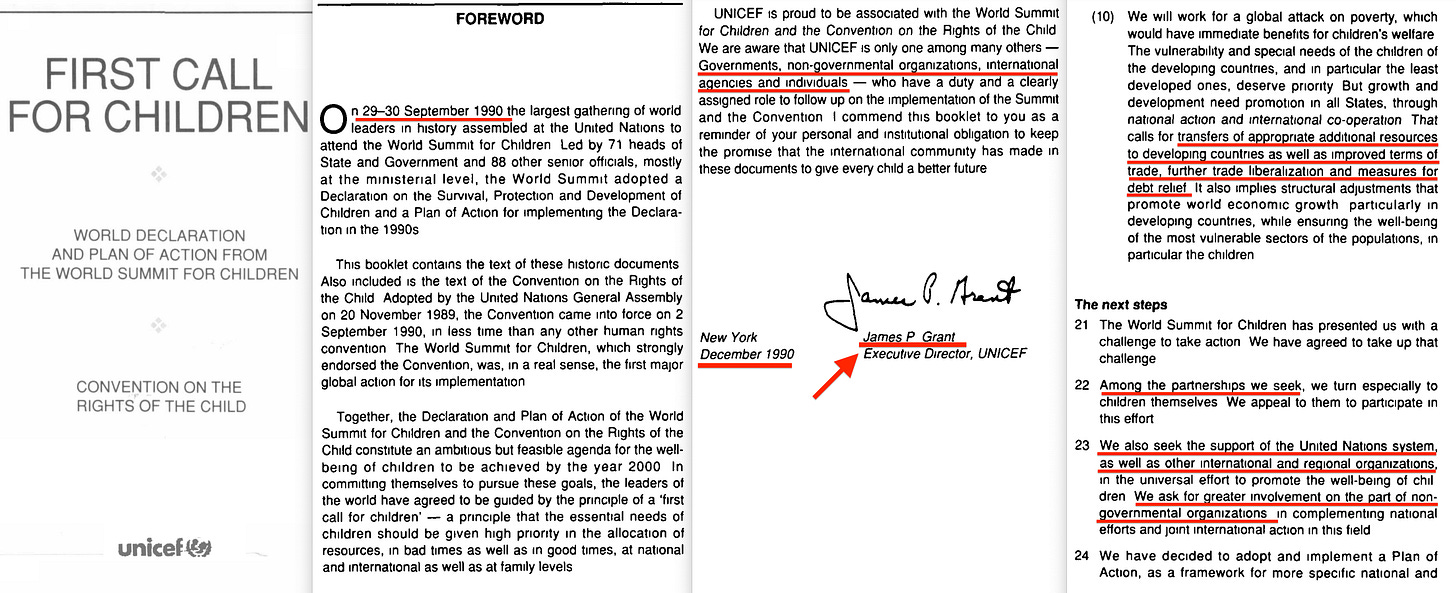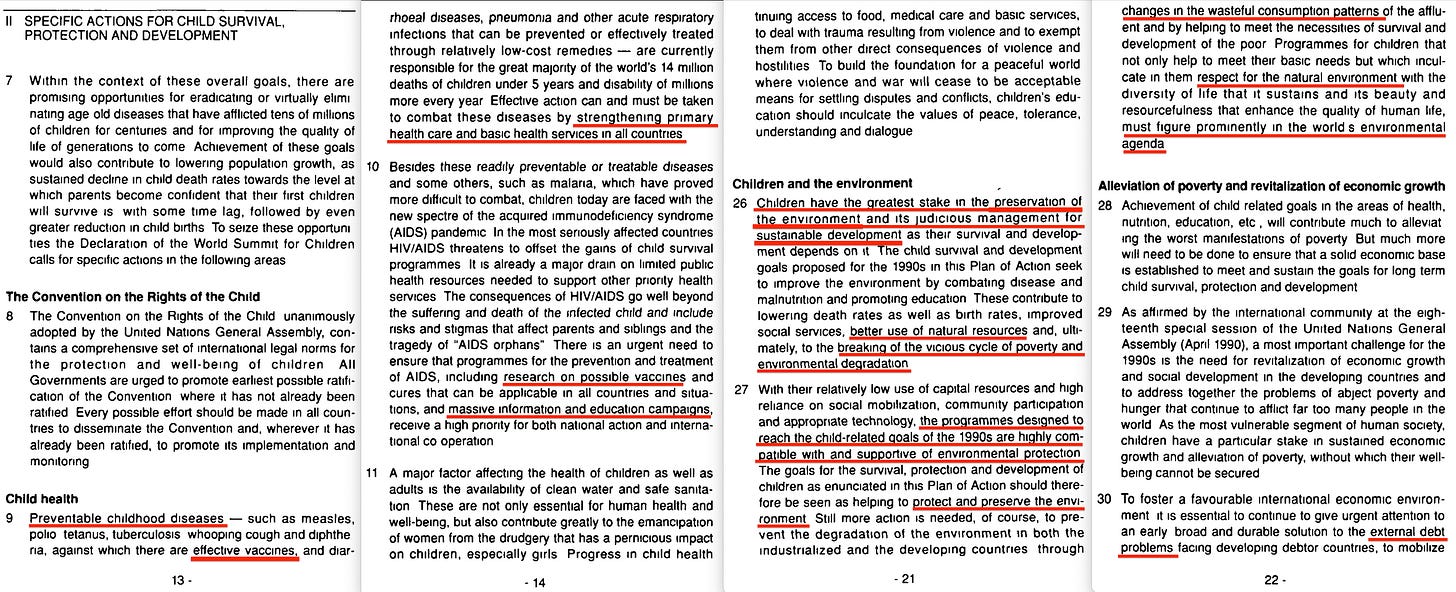First Call for Children
Does the name ‘James P Grant’ strike a bell? It should, as he was pivotal in championing the concept of ‘Selective Primary Healthcare’.
And mere months after the concept was floated, Grant became Executive Director of UNICEF, position he held until 1995. And notably, it was under his leadership that the 1990 World Summit for Children was held - yielding an output document which raises more than an eyebrow upon closer inspection some 34 years on.
We previously discussed primary healthcare which - in short - centralises information, education, drugs, and vaccines at the top of the hierarchy, while the rendering of actual services is ‘decentralised to the lowest appropriate extent’.
And selective primary healthcare essentially capitalises on this centralisation, delivering information, rehydration therapy, and… yes, vaccines.
And here’s a longer note on the topic of Universal Health Coverage - of which primary healthcare serves as the very cornerstone.
The seminal article on 'Selective Primary Healthcare'1 was authored by Dr. Julia Walsh and Dr. Kenneth S. Warren, both of whom were affiliated with the Rockefeller Foundation at the time of writing2. And Grant, too, is frequently found associated with everyone’s favourite ‘philanthropes’.
‘On 29-30 September 1990 the largest gathering of world leaders in history assembled at the United Nations to attend the World Summit for Children’3. And that event is notable, not because the output document - ‘First Call for Children’ - was signed by Grant himself. It was notable not only for the high-level participation of world leaders but also for the unprecedented inclusion and influence of non-governmental organizations (NGOs) in the proceedings. This summit was one of the first instances where NGOs were recognized as crucial partners in global policy-making, especially in areas concerning health, education, and welfare of children.
And the conclusions included calls for -
‘… transfers of appropriate additional resources to developing countries as well as improved terms of trade, further trade liberalisation, and measures for debt relief‘.
Please, won't someone think of the children?
‘Among the partnerships we seek… the United Nations system, as well as other international and regional organisations… We ask for greater involvement on the part of non-governmental organisations.‘
It’s to promote the well-being of children. Agree, or you’ll be smeared by the MSM.
Already in the introduction on page 10, the call for NGO inclusion is repeated -
‘This plan of action is intended as a guide for national Governments, international organisations, bilateral aid agencies, non-governmental organisations (NGOs) and all other sectors of society…‘
… but this call further draws in ‘all other sectors of society’ - the definition of which is further expanded upon on page 26 -
‘Families, communities, local governments, NGOs, social, cultural, religios, business, and other instutions, including the mass media…‘
And yes, this is rapidly starting to sound awfully similar to ‘stakeholders’. And naturally, they are expected to -
‘… establish approproate mechanisms for the regular and timely collection, analysis and publication of data required to monitor relevant social indicators… immunisation coverage…‘
This - in short - refers to the Determinants of Health.
And skipping to page 31 we find conformation that the conference indeed was ‘… attended by virtually all Governments the relevant United Nations agencies… and a large number of NGOs These goals are recommended for implementation by all countries.‘
Pages 13-14 detail that -
‘Effective action can and must be taken to combat these diseases by strengthening primary health care and basic health services in all countries‘
Primary health care - check.
‘Preventable childhood diseases - such as measles, polio, tetanus, tuberculosis, whooping cough and diphtheria, against which there are effective vaccines, … respiratory infections that can be prevented or effectively treated through relatively low-cost remedies…‘
Vaccines, remedies (ie, frequently drugs) - check & check.
‘There is an urgent need to ensure that programmes for the prevention and treatment of AIDS, including research on possible vaccines and cures that can be applicable in all countries and situations, and massive information and education campaigns, …‘
Education, information - check & check. It’s practically the full palette of ‘selective primary health care’, and all in the name of saving the children, with an additional call for vaccine research. But not content staying on the narrow description of health -
‘Children have the greatest stake in the preservation of the environment and its judicious management tor sustainable development…, better use of natural resources and, ultimately, to the breaking of the vicious cycle of poverty and environmental degradation‘
Bet you didn’t see that one coming, eh? This - too - is about the environment!
‘…, the programmes designed to reach the child-related goals of the 1990s are highly compatible with and supportive of environmental protection. The goals for the survival, protection and development of children as enunciated in this Plan of Action should therefore be seen as helping to protect and preserve the environment‘
Yes, we have to save the environment or children’s health will suffer.
‘… changes in the wasteful consumption patterns of the affluent… respect for the natural environment…, must figure prominently in the worlds environmental agenda‘
And now we see almost the entire environmenalism palette included! Oh wait, no, there’s one more -
‘To foster a favourable international economic environment it is essential to continue to give urgent attention to an early broad and durable solution to the external debt problems facing developing debtor countries, …‘
Yes, yes - now external debt issues are now ALSO related to childrens health! Frankly, it’s hard to rule out anything not being linked to children’s health at this rate.
We jump to page 23 -
‘… as countries reduce military expenditures, part of the resources released should be channelled to programmes for social and economic development, including those benefiting children. Debt relief schemes could be formulated…‘
Eliminate defense; give the money to poor nations and ‘save the children’ through debt relief schemes. Sounds legit.
‘Debt relief for children including debt swaps for investment in social develooment programmes, should be considered by debtors and creditors. The international community, including private-sector creditors are urged to work with developing countries and relevant agencies to support debt relief for children‘
.. perhaps is it just me, but does it - just a teenie, tiny bit - appear as though private equity is asking wealthy nations to bail out their terrible 3rd world bond portfolio?
‘National Governments should encourage and assist provincial and local governments as well as NGOs, the private sector and civic groups to prepare their own programmes of action…‘
Governments, the private sector, and civil society I think you meant to say - aka ‘the stakeholders’. And all this in a document, begging for a bailout in the name of…
‘… child survival…‘
Honestly, there’s only so much I can take out of these parasitic psychopaths. They beg for a private equity ‘debt relief’ bailout in the name of ‘saving children’, while ensuring ‘child survival’ through ‘safe and effective’ vaccines…
‘Governments, industry and academic institutions are requested to increase their efforts in both basic and operational research, aimed at new technical and technological breakthroughs, more effective social mobilization and better delivery of existing social services. Some examples of the areas in which research is urgently needed include, in the field of health, improved vaccination technologies, …‘
… oh wait, I almost forgot that they also want you to pay for improvements to said ‘vaccination technologies’.
Ah, but wait. After all, it’s not as though they outright state this being a case of early trisectoral governance, right? Weeeeeeeell… about that. In 1999, UNICEF posted an article4 which - strangely - appears to have since gone missing. The title of said article? Public, Private and Civil Society.
‘As Secretary-General Kofi Annan put it recently, we now know that peace and prosperity cannot be achieved without a broad expanse of active partnerships - partnerships that involve sharing responsibilities not only with governments, but with international organisations, civil society and the business community.‘
It goes on to list the 1999 Davos event, previously covered over here.
‘… the UN is working to promote private-sector development and direct foreign investment… the private sector has a major role to play in the realisation of human rights… it is also important to see the private sector in a more expansive context, as a source of knowledge and expertise for multilateralism‘
Ah, yes - profit seeking enterprise is clearly very, very important in the scope of ‘human rights’ - with this, I’m sure 3rd world sweatshop utilising Nike will agree. It then proceeds to slobber all over NGOs in the most nauseating of manners, dragging in the context of ‘ethics’, before carrying on with -
‘That is why, in 2001, when UNICEF holds its next great event for children, we intend to make it an occasion in which NGOs will be welcomed as full members, along with other representatives of civil society, the private sector, governments and UN agencies‘
… and there you go. Full integration of the corporate agenda into ‘saving children’.
‘It will also stand as the culmination of the process that began in 1990 with the World Summit for Children, where a handful of NGOs were granted token representative status by governments - to the Earth Summit, where NGOs were directly involved for the first time in preparatory talks as well as the Summit, and on through to the Social Development Summit in Copenhagen, the Beijing Women's Conference, and the Habitat Conference in Nairobi - all of them events where NGOs moved closer and closer to full partnership‘
The issue here, of course, is that a great many of those NGOs are fronts for the foundation class, where said foundations are run by the same billionaires who control the businesses involved in said UN trisectoral governance models.
In other words; what took place during the 90s - while everyone was busy with the Berlin Wall coming down, and the alleged end of communism in Eastern Europe - was a subversive, corporate takeover of the United Nations.
‘For all the importance of NGOs and other representatives of civil society, for all the potential value of development partnerships with business and the private sector, we must never lose sight of the fact that it is governments that remain the primary actors in this fundamental relationship for development.‘
And that quite simply is just a complete and utter lie.
So to finish off -
The 1990 World Summit for Children not only initiated action plans at the national level to roll out selective primary healthcare but also addressed a variety of secondary and tertiary issues such as environmental health. It further called for private equity bailouts through debt relief, involved significant NGO participation, and was an early example of trisectoral governance - also known as the ‘stakeholder approach.’
This summit marked a pivotal moment… perhaps not so much in advancing children's rights and wellbeing globally, but rather through emphasizing the collaboration between public, private, and civil society sectors.
And UNICEF's 1990 article confirms and further elaborates on the progressive development of this governance model, framed as a commitment to ‘children's health’ -in the most cynic of ways.
But it’s important to consider that if the gradual development of this governmental structure began in 1990, then subsequent milestones - such as the release of 'Our Global Neighbourhood' in 1995 and Kofi Annan’s reforms in 1997 - did not drive this process.
So what did?












Never about the good
When mentioning UNICEF, you should always obligatory reference their involvement in, and non-prosecution of, child rape.
"Children as young as 6 have been forced to have sex with aid workers and peacekeepers in return for food and money, Save the Children UK said in a report released Tuesday. "
https://edition.cnn.com/2008/WORLD/europe/05/27/charity.aidworkers/
"AP Exclusive: UN child sex ring left victims but no arrests"
https://apnews.com/article/africa-arrests-united-nations-only-on-ap-e6ebc331460345c5abd4f57d77f535c1
"Sexual exploitation and abuse by UN peacekeepers"
https://home.crin.org/issues/sexual-violence/un-peacekeepers
"Unicef admits failings with child victims of alleged sex abuse by peacekeepers"
https://www.theguardian.com/global-development/2018/feb/13/unicef-admits-failings-with-child-victims-of-alleged-sex-abuse-by-peacekeepers
"UN aid worker suspended for leaking report on child abuse by French troops"
https://www.theguardian.com/world/2015/apr/29/un-aid-worker-suspended-leaking-report-child-abuse-french-troops-car
It always sets the correct tone on how to interpret the rest of their actions. Otherwise normies will think you're just ragging on a "nice" charity who cares for the widdle children's health. Once they realise they engage in child sexual exploitation they grasp these people are evil. Feel free to add or use the links as an addendum.